Young politicians call for Awami League to be excluded from elections for at least three terms
-671932e53d438.jpeg)
Asaduzzaman Fuad and Rashed Khan (from left to right)
To bring down Sheikh Hasina and end her 15-year fascist regime, people from all backgrounds took to the streets, risking their lives during the tumultuous three weeks of July and August.
However, it has primarily been the political parties—led by the Bangladesh Nationalist Party (BNP)—along with several smaller factions that have long fought against this oppressive regime.
Their steadfast resistance has paved the way for such a swift conclusion to Hasina's rule.
Asaduzzaman Fuad, a London-trained barrister, has become a prominent figure in this struggle, known both on the streets and in television discussions. With his eloquent speaking style, he has long questioned the misdeeds of the Hasina administration.
As the joint member secretary of the Amar Bangladesh (AB) party, he has actively campaigned against Hasina, both politically and by shaping the narrative in the international arena through numerous interviews.
Muhammad Rashed Khan emerged during the 2018 student-led movement advocating for job quota reforms. Following the success of that movement, their platform, Gono Odhikar Parishad, evolved into a political party, with Rashed now serving as secretary general.
He has continued to challenge Hasina's regime over the past few years, often facing direct backlash from various branches of the administration. Despite this, Rashed has remained resolute, ensuring that nothing would distract him from his goal of toppling the fascist regime.
-67192e14d8c1d.JPG)
Recently, Bangla Outlook (English) editor Faisal Mahmud interviewed these two young politicians to discuss the July Revolution, the role of smaller political parties in dismantling Hasina's rule, and their perspectives on reform discussions and nation-building.
Here is an excerpt from that interview.
Faisal Mahmud: My first question is to Barrister Fuad. It is about what we refer to as the Long July Revolution or the Long July Uprising. Some people say it was very deliberately planned, while others claim there was a mastermind behind it. Yet, many argue it was spontaneous. As a young politician, what do you think the movement really is? Was it pre-planned, semi-planned, or how do you perceive the way things progressed?
Asaduzzaman Fuad: This movement was entirely unplanned; it emerged organically, evolving hour by hour and day by day. One defining feature of the monsoon revolution is that no individual can claim to be its mastermind; no one deserves sole credit. On the 19th, when universities were vacated, many key organizers declared the movement over and were uncertain about the next steps.
Yet, unexpectedly, the movement gained momentum in private universities and madrassas, spreading to the national university. Those who had left the universities reignited the movement in their neighborhoods, districts, and sub-districts. As the movement swept across Bangladesh, it became clear that it was not orchestrated.
However, it’s important to note that before frying bread, one must first light the clay oven. It requires a considerable amount of time to heat it with wood and kindling. The pan must also be warmed before placing the bread on it.
The current reality in Bangladesh is that the movements of political parties, civil society demands, and public grievances over the past 16-17 years have effectively heated that oven and pan. This already heated pan was simply ignited by a spark, leading to the movement. Thus, while it wasn't planned, all the necessary conditions for such an upheaval were present in society, allowing the movement to spread rapidly across the country.
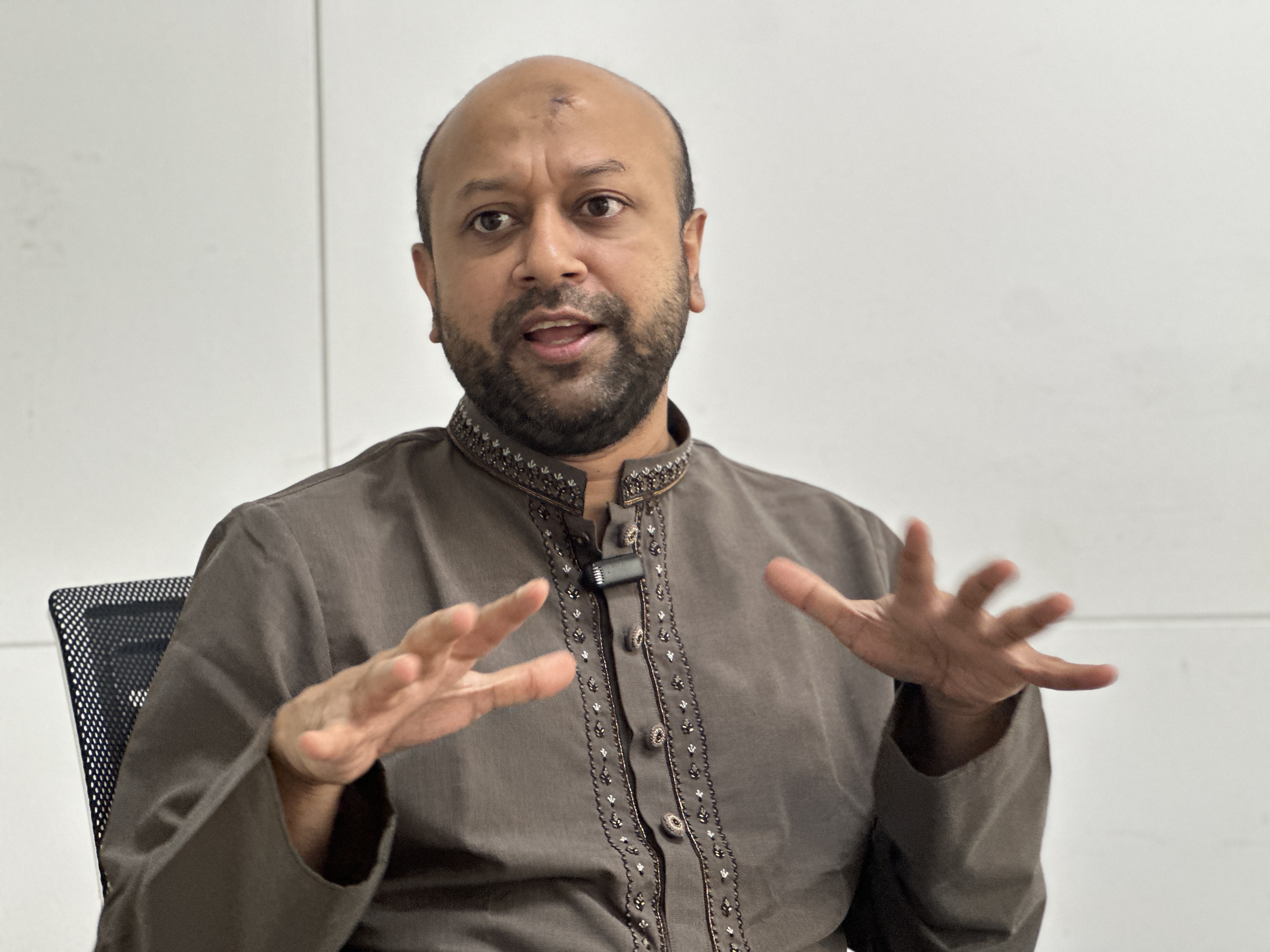
FM: The same question to you, Rashed…
Muhammad Rashed Khan: Let me give you a bit of historical context. We spearheaded the quota reform movement in 2018, which proved successful, and later, in 2021, a writ was filed regarding the issue. As a result of this writ, the quota for the children of freedom fighters was reinstated in 2024.
Essentially, this was a mistake on the government's part; they believed that canceling the quota meant the children and grandchildren of freedom fighters would not secure jobs. They manipulated the situation to reinstate the quota through the judiciary which had backfired for them.
Fuad Bhai accurately noted that some argue this movement was a planned mass uprising, but I agree with him that there was no master plan or strategy behind it. For a movement or mass uprising to emerge, however, the necessary environment and circumstances had been developing for over 15 years.
It was somewhat unpredictable whether the movement would conclude in July or August, or take longer. It appeared likely that Sheikh Hasina might soon fall due to reckless actions within her administration, including from the student and youth leagues. She often spoke in a manner that indicated a lack of balance, making evident mistakes that ultimately led to a tipping point.
The movement truly ignited when Sheikh Hasina referred to ordinary students as the "children of collaborators." Was that a master plan? Did she unwittingly conspire against herself? I believe that if there’s any mastermind here, it’s Sheikh Hasina herself; her errors fundamentally led to her downfall.
As Sheikh Hasina continued to make blunder after blunder, we sensed an opportunity to shift this into a broader movement for governmental change. However, we had no guarantees that this would constitute a master plan for overthrowing the government. We were doing our utmost, and I believe that divine mercy played a crucial role in our success. Without Allah’s mercy, this movement may not have achieved its goals.
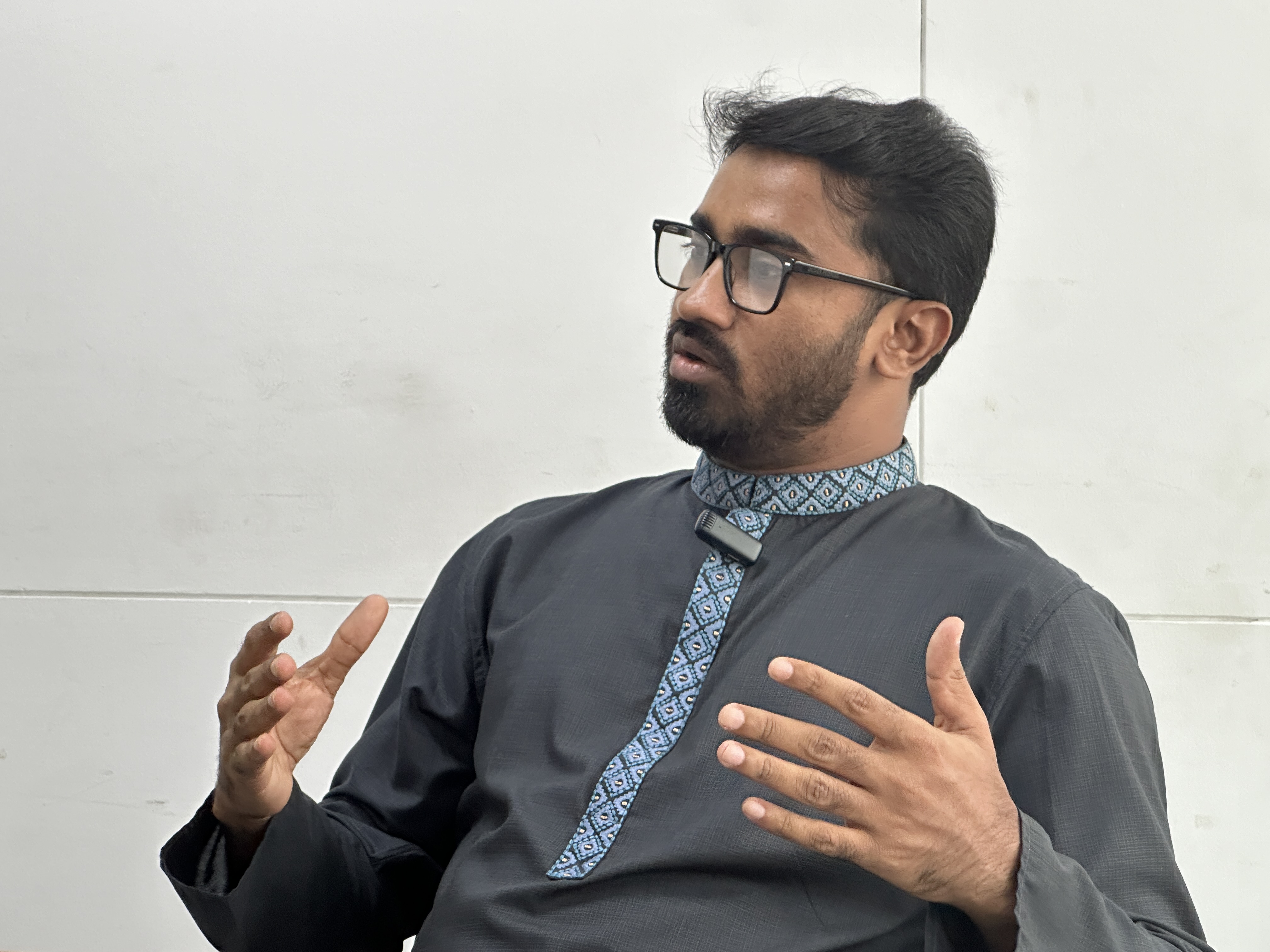
AF: Let me add something here. Another significant development over the past 16-17 years is the growing consensus among the entire nation. Sheikh Hasina has been labeled the sole villain in Bangladesh during this period. People from all walks of life and various sectors have come to view her as a collaborator, seeing her as a national enemy, especially those struggling in the middle-class market, grappling with decisions about what, how much, and when to buy.
Businesspeople are burdened by bribes, taxes, VAT, and advance payments, often without receiving any refunds. They face harassment from customs and tax authorities, leading them to perceive Sheikh Hasina as a collaborator who needs to be removed. Over these 16-17 years, political activists in Bangladesh have been subjected to countless false cases. Over a ten million people have been displaced from their homes, and thousands have suffered enforced disappearances, murders, and genocide. This has led to a collective determination that Sheikh Hasina must go.
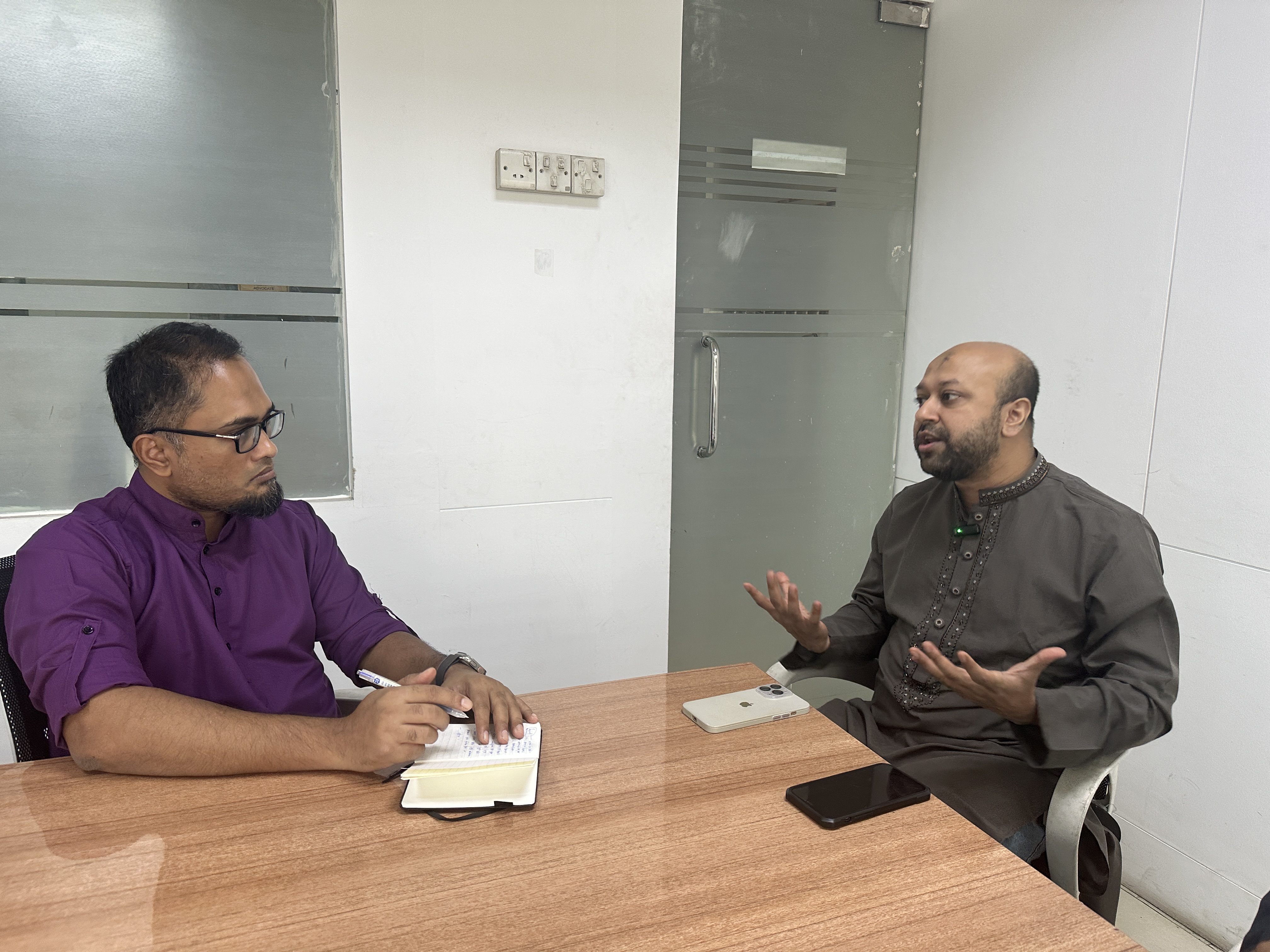
Now, those who work hard for a living—small shopkeepers, rickshaw pullers, and vendors—are experiencing worsening conditions and a loss of dignity. They have come together with the message: “Sheikh Hasina, you are a collaborator. You must go.” This shared sentiment was symbolically embodied in events like the shooting of Abu Sayeed in July, which reflected the broader frustrations of the nation.
The blood from that incident resonated with the grievances and suffering felt across Bangladesh, intensifying anger over the brutal treatment of female students at Dhaka University. As those of us involved in student politics know, both sides usually made an effort to protect the dignity of female students during conflicts. However, the violent scenes from that day, where young women were beaten and left in the streets, have profoundly shaken public consciousness.
As a result, the student community has united in a singular agreement: “Sheikh Hasina, you are a [Razakar] collaborator. You must go.” Each individual plea for her departure has transformed into a powerful wave of dissent. And she was forced to flee.
FM: How would you evaluate the roles of small political parties in the July revolution? How did they contribute? Rashed Shaheb, you go first…
MRK: When Abu Sayeed was brutally shot in Rangpur, and on the same day, Wasim, a student leader, was shot in Chittagong, we were in our office with the Gana Adhikar Parishad, the AB Party, and the NDM. We quickly decided that these three parties would protest together. This was the first protest by any party in response to the killings on July 16; prior to this, no party had condemned the murders.
This underscored the need for political parties to participate in a mass uprising. The Gana Adhikar Parishad, AB Party, and NDM initiated this movement, and just 30 minutes before our conversation, three individuals had been shot, fueling our anger. At that moment, we, including our president Nurul Haq Noor, Manju Bhai, and Bobby Hajjaj from NDM, were very vocal in our outrage.
The next day, under the banner of anti-discrimination, we organized another rally and protest march together. This sent a clear message to other parties that, since the Gana Adhikar Parishad, AB Party, and NDM had taken a stand, they too needed to join in. This triggered a wave of protests among political parties across the nation, emphasizing the need for action.
The term "student-led movement" is indeed applicable here, as there was significant student involvement, which I noted earlier. Changing the government cannot rely solely on party movements; it requires the participation of the middle class, ordinary citizens, and students. With students already engaged, it became essential for the political parties to mobilize as well.
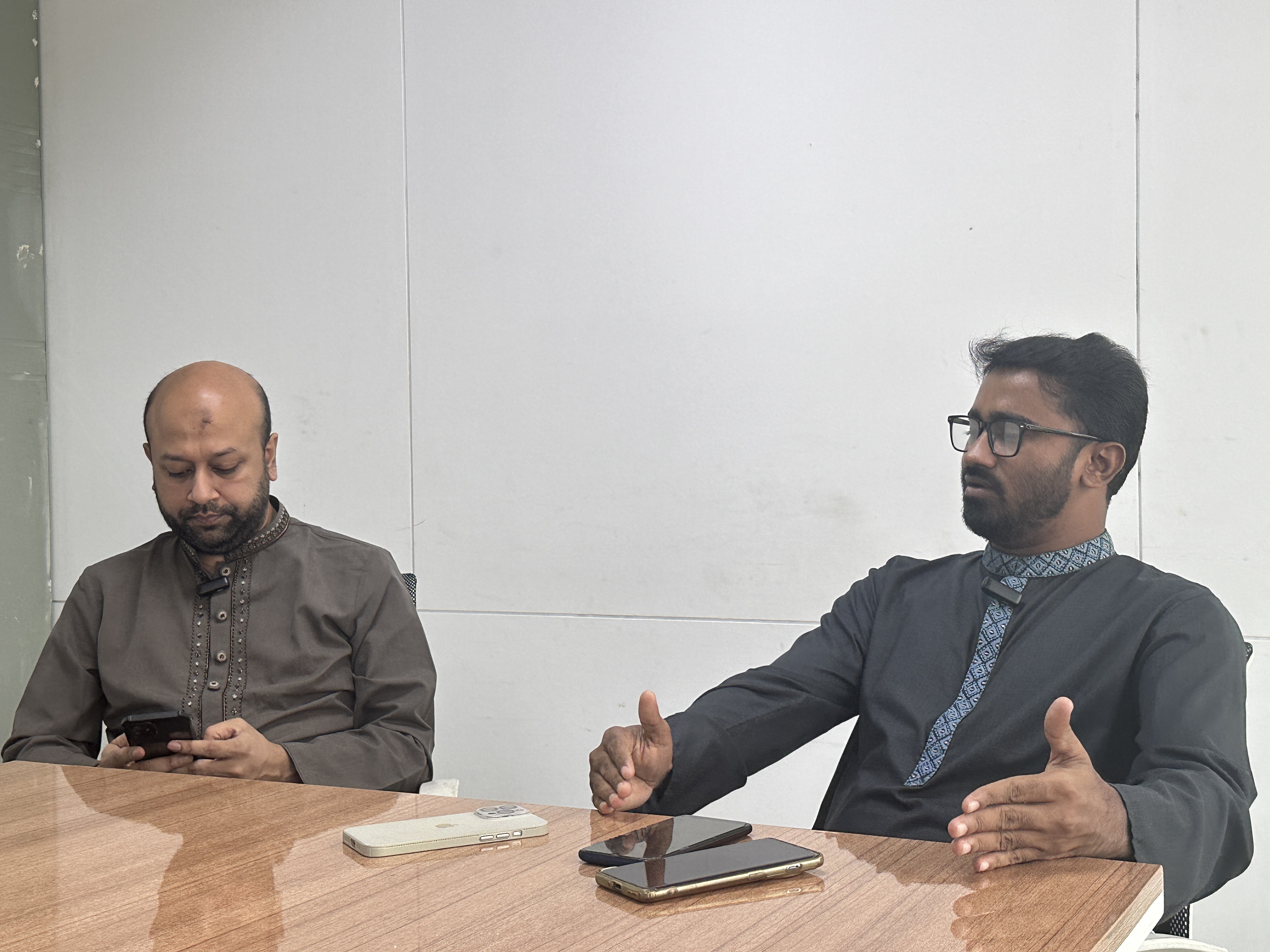
We had strategies in place for this. Whether it was the AB Party, Gana Adhikar Parishad, or NDM, we collaborated closely. Additionally, it's important to note that we had planted the seeds of this movement back in 2018; we were pioneers in this effort. We felt it was crucial to harness this momentum. By the grace of Allah, we were given the opportunity to make it happen.
I have established good relationships with many senior leaders of the BNP. I suggested that as a major party, the BNP should actively engage in this movement. I personally spoke with three leaders, including one who is very close to the acting chairman Tarique Rahman and another who has a strong connection with him as well. I emphasized the importance of BNP's involvement in this initiative. Following our discussions, there was a meeting of the BNP's standing committee, during which Tarique Rahman designated a leader to coordinate with me regularly.
It's important to mention his name: Salahuddin Ahmed, a member of the BNP's standing committee. He is responsible for coordinating this movement with other parties. While my voice may not carry weight with Hefazat or Jamaat, they are more likely to respond when it comes from a major party. From that standpoint, Salahuddin has been instrumental in connecting with Jamaat, Hefazat, and other groups. I believe the AB Party has also reached out to major parties for coordination.
From my perspective, I shared our experiences within our party and had the opportunity to work closely with Tarique Rahman and Salahuddin throughout this movement, ensuring broad participation from the BNP's student and youth wings.
I emphasize this because I have seen firsthand the roles parties have played and the contributions they have made. Therefore, it is clear that we cannot overlook the significance of political parties in this context; they have played a crucial role alongside the student wing.
FM: What is your take on this, Fuad bhai…
AF: The influence of both small and large political parties has been significant over the past 16 to 17 years. The movement for democracy began with the 2008 elections, which were conducted under a regime installed by Delhi. While some portray the 2008 elections as legitimate under a caretaker government, I personally disagree with that perspective. After reading Pranab Mukherjee's "The Coalition Years," I believe the debate is closed. Additionally, numerous military officials have indicated that there was a deliberate decision to diminish the BNP's presence in at least 100 seats during the 2008 elections.
In contrast, the BNP became the opposition party in 1996 despite facing substantial movements against it. It's hard to believe that the Awami League was so popular in 2008 that the BNP would only secure 30 to 35 seats; this was clearly orchestrated. Even though the BNP was in parliament, I maintain that the 2008 election was not a genuine one. Unfortunately, the BNP has not forcefully asserted this, and we would like them to.
Since then, all political parties, including the BNP, Jamaat, student wings, Shibir, youth wings, and Hefazat, have been engaged in an ongoing struggle against fascism. They have fought for rights, democracy, and elections, with thousands sacrificing their lives, including military personnel.
The Pilkhana massacre saw numerous soldiers and BDR officers dismissed on suspicions of being BNP supporters, labeled as terrorists, and accused of failing to perform their roles in the elections or being involved in abductions and killings.
Thus, the sacrifices of the past 16 years extend beyond civilian political activists to include many military personnel who have also been victims. Their collective struggle has transformed the events of July and August into a powerful outcome.
Unlike other movements, where political parties typically take the lead, for 16 years, these parties have laid the groundwork for this uprising. While it's true they have heated the political climate, it's also true that the final leadership of the movement did not rest solely with them. As a political worker, I must acknowledge this reality; to deny it would be to ignore the truth.
In previous rounds, political parties scored all the goals, but in the final moments, decisive contributions came from figures akin to Messi and Ronaldo, with the political parties facilitating their efforts. It's important to note that while the political parties created the ball from the back, midfield, and defense, the ultimate leadership of the movement belonged to the student community—not just at Dhaka University, but across all public universities, national universities, madrassas, and in local neighborhoods and private institutions.
Following the 19th, the involvement of students from BRAC and North South University has been pivotal. Hundreds of students from madrassas, Quranic scholars, and educators have made the ultimate sacrifice. We must acknowledge these contributions from everyone involved.
It's also important to note that among the 1,600 martyrs identified, approximately 250 to 300 are students, while the remainder are not. So, who are they? They are ordinary workers—rickshaw pullers, Mofiz, Karima, and Rahima—individuals whose names we may not even know. They represent the most marginalized citizens of our society, akin to the Dalit community. These individuals are joining the movement from their slums, neighborhoods, and local areas to voice their suffering and anger.
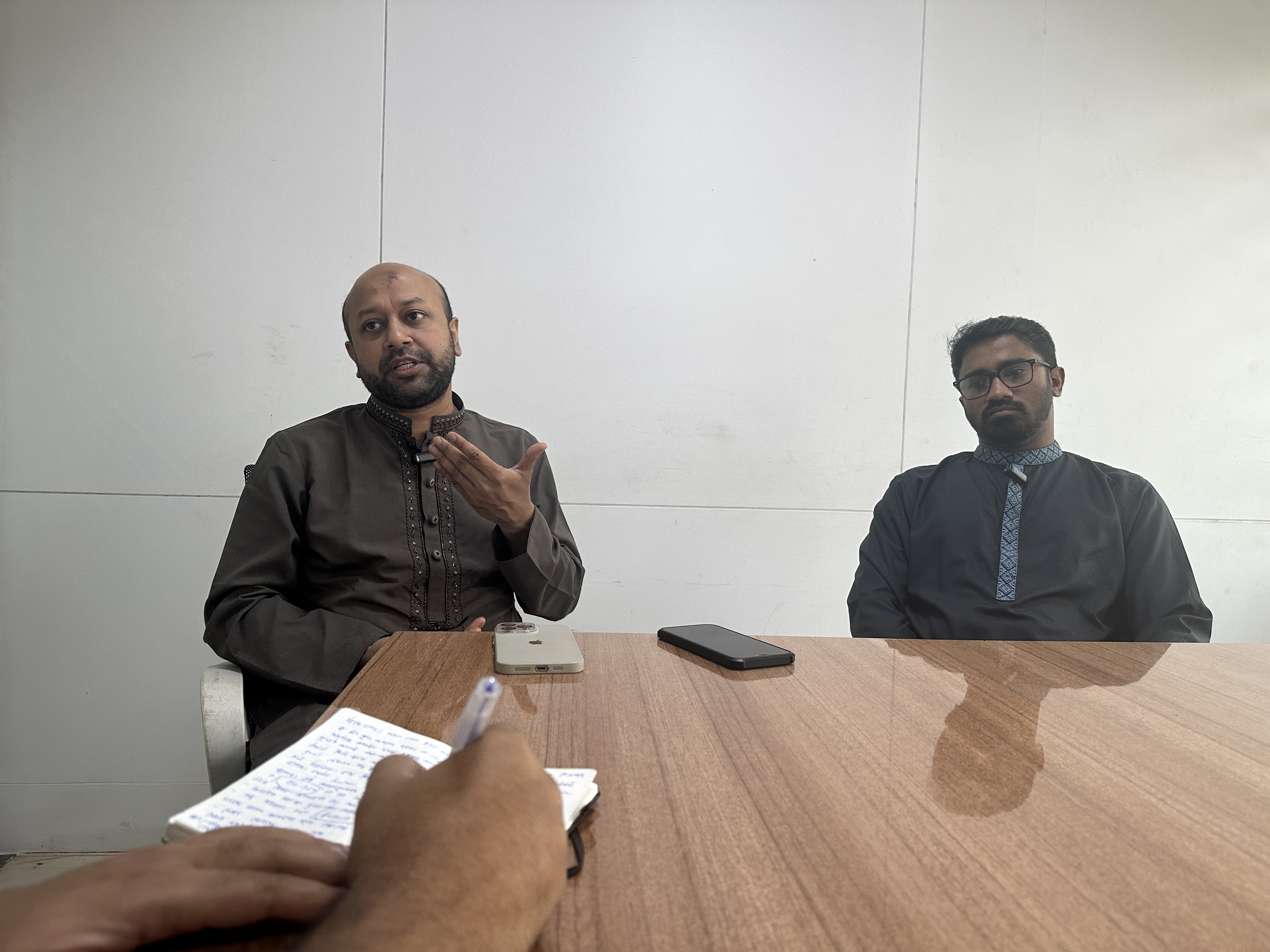
Their dignity is on the line; when they seek to buy food, they often find it beyond their means. This issue goes beyond mere financial capacity; it is deeply tied to their dignity as citizens. After 53 years, no one should have to struggle to afford basic necessities like beef. This situation contradicts the declaration of independence, which promised the guarantee of human dignity.
In this light, we cannot overlook the contributions of political parties. We must always express our gratitude to every force beyond them and to every individual who has contributed in any way. It is essential to recognize their efforts.
FM: Following this revolution, the Yunus government has taken power, prompting several questions regarding the necessity of reforms and discussions about a new political arrangement. As a politician, how do you perceive these reforms and political arrangements? What specific reforms are being considered, and which areas are they aimed at? Additionally, what does the phrase "new political arrangement" signify, and how do you believe the general public interprets this?
AF: There’s considerable debate regarding the nature and mandate of the current interim government. However, we’ve consistently stated that this is not a typical election-time government. Unlike the usual administrations that operate under a three-month mandate, this government emerged not from a final political party movement.
If you examine the slogans and wall writings from those leading this movement, particularly within the student community, you'll see their broader mandate: "The country doesn’t belong to anyone’s father," "We don’t want the old fascist system," and "Shaheed Abu Saeed Mugdho, the war is not over." These expressions indicate that the government's mandate extends beyond mere elections; it encompasses a mandate for change.
What does this "election plus" mandate entail? It signifies a need to transform the political system. Key changes were initiated in 1991 and again in 1996, when political parties reached a consensus on a minimum electoral management system. This system ultimately collapsed during the events of 1/11 and was entirely dismantled with the repeal of the Fifteenth Amendment in 2011. In this context, whether or not elections occur under the interim government’s mandate is irrelevant. They hold the authority to implement reforms, take the necessary time, and organize elections.
However, this mandate must be continuously renewed, as the circumstances surrounding it from July-August will not persist indefinitely. Therefore, it’s crucial for the government to engage in ongoing discussions with political parties, stakeholders, civil society, representatives from the student community, and various professionals. They need to maintain a dialogue about their actions and the challenges they face.
What will emerge is what can be termed a corporate extension of mandate. If the government performs well this month, its mandate will be renewed for another month, along with an increase in salary and bonuses. This auto-renewal must be confirmed each month through discussions with state stakeholders.
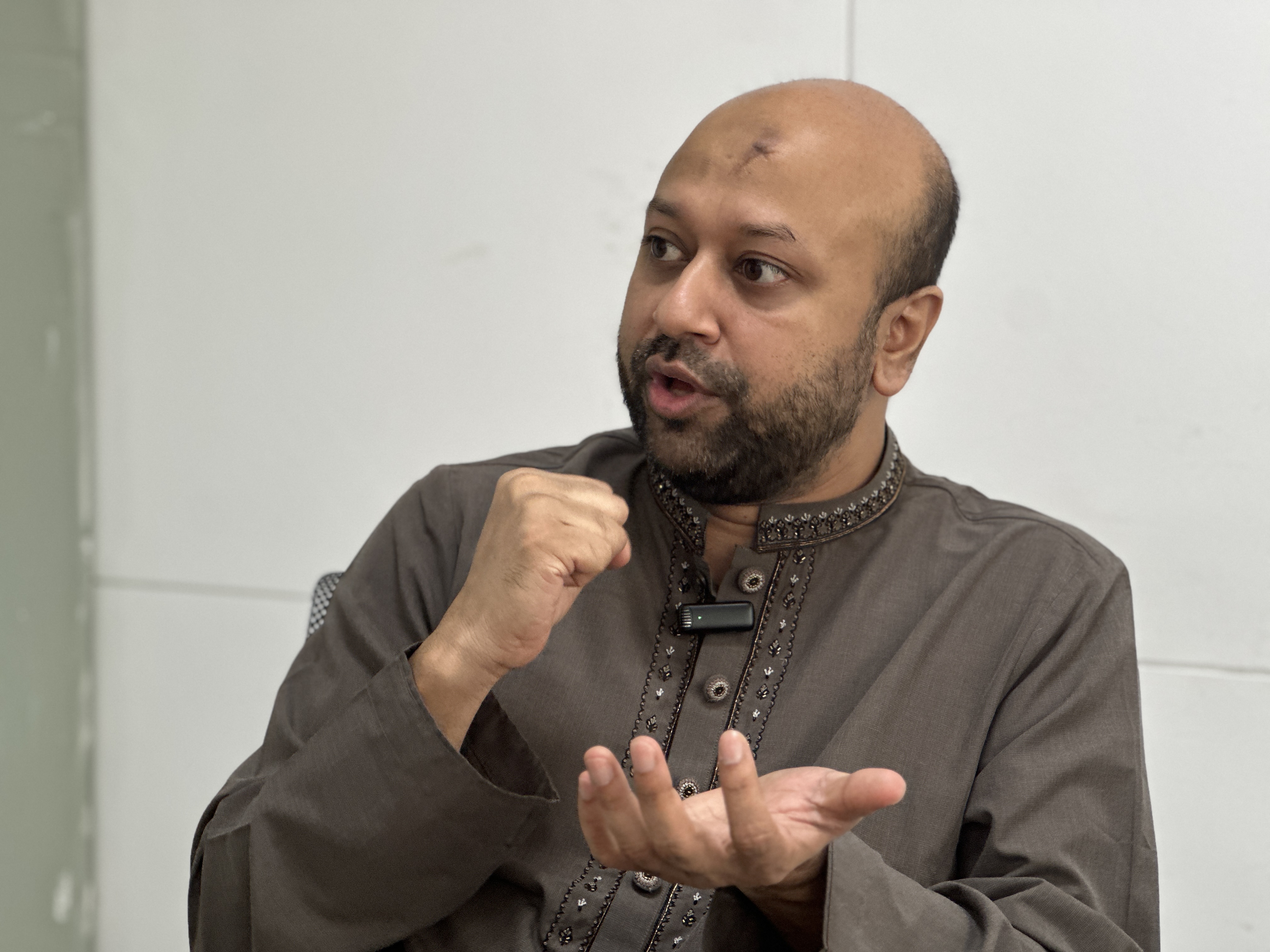
Additionally, there’s an ongoing debate about the reforms this government can and should implement. Some argue that since elections are a significant undertaking, all necessary reforms can be assigned to them. I disagree. If the people demand specific reforms, those can be pursued. However, when it comes to implementation, stakeholders will likely raise questions. It’s crucial to start discussions on any reform and keep the conversation alive; I’ve seen the importance of this from the experience of 1/11.
They established a reform committee led by Dr. Ali Akbar Khan, which made numerous recommendations, but the subsequent government failed to endorse them. This time, I want all political parties to sign a written charter outlining every reform. We cannot let reforms demanded at such a cost be disregarded by an elected government. We must avoid this betrayal of sacrifice.
Every political party should publicly declare its position on these reforms and clarify its stance once in power. This should be a publicly available written charter. Alternatively, if the parties agree, we could hold a referendum on each reform, allowing the nation to vote. This could take place under the current government, facilitating the development of a reform document and a new system.
What will this new system entail? There’s a connection between the political system and the creation of our constitution, which I personally believe is deeply flawed.
FM: Rashed, to you….the discussion is about reforms and simultaneously a new political arrangement. What will be the role of reforms, and what will the new political arrangement entail?
MRK: We believe that reform is an ongoing process. There are voices, including from the government, suggesting that reforms should come before elections. However, I think it's essential to first change the mindset of the people of Bangladesh. For instance, the prevailing mentality often revolves around "the Awami League is in power" or "another party was in power." This toxic way of thinking persists in our society, making it crucial to reform our attitudes.
We carried out a mass uprising and resisted the Awami League, but that doesn’t mean everyone has become virtuous. There are still many negative elements in society. Thus, a shift in people's mindsets is necessary. Once this happens, it will be easier for the existing commissions to implement reforms effectively. Without this change, we will remain stuck in our old ways, and no amount of documentation will make a difference.
Furthermore, it is unrealistic to expect the government to implement comprehensive reforms in a short period. If they attempt to do so, they would need a minimum of 10-15 years, which the people and political parties of Bangladesh are unlikely to accept. We believe that key reforms, particularly in the Election Commission, the judiciary, and the administration, should take place before elections are held.
The army chief has already stated that they will support this government for 18 months. If we dismiss this statement as trivial, we shouldn't; it carries significant weight. The army chief has emerged as a key figure during this time, and I’ve spoken to many of his close associates who have worked alongside him. Some have formed strong friendships with him, and he is known to be honest, principled, and religious. It has even been mentioned that he leads prayers when they pray together.
There has been much speculation suggesting he is a relative of Sheikh Hasina and will always protect her, implying that his appointment was made from a security standpoint. However, the reality is quite the opposite. The army chief has aligned himself with the patriots and stands with the people in this uprising. This is why I believe the army is willing to cooperate with this government for reform over the next 18 months. If the government seeks to extend its tenure beyond that, it would pose a risk.
I think that within these 18 months, crucial reforms need to be implemented in the Election Commission, the judiciary, and the administration, along with recommendations in other areas. There should be formal documentation regarding these reforms. We’ve discussed the need for a charter that political parties must sign, as verbal assurances can’t be relied upon. We experienced failures after 1990 and again after '71, and now, the mass uprising and genocide of 2024 have created a new historical moment.
FM: In Bangladesh, when we discuss major political parties, we typically think of the traditional two-party system common in many nations, featuring center-right and center-left parties. However, this binary perspective, which centers around the Awami League and the BNP, appears increasingly constraining. Following this mass uprising, how likely do you believe the Awami League is to make a political comeback? Do you think such a resurgence is feasible? If not, what are the reasons behind this?
AF: Let me first talk about the future of the Awami League, the Jatiya Party, and the 14-party alliance. What lies ahead for them politically? While they have the right to participate in politics, we must confront their serious political misdeeds, including genocide, human rights violations, the destruction of democracy, broken oaths, and constitutional breaches. What solutions do we propose for these issues?
I recommend organizing a public hearing and establishing a commission to investigate these matters. Should we consider a model like Germany or Italy to ban their political activities, or adopt a South African approach that brings those responsible for significant constitutional violations to justice while allowing for some reconciliation?
We've witnessed the International Crimes Tribunal addressing those who committed criminal acts and violated human rights. However, will political leaders be held accountable as primary offenders? Considering that Awami League leaders are part of this process, what will their party's position be? We also need to discuss the commission's role in addressing those who have deprived us of democratic elections—specifically in 2014, 2018, and 2024—to ensure they cannot participate in future elections.
Should we suspend those who were illegally elected as MPs or ministers in recent terms? Given the allegations of human rights violations and corruption against members of the Sheikh family, should they be allowed to engage in politics? The political stance of the Awami League requires a comprehensive analysis and transformation. We need to show the nation that we’ve faced significant failures and must seek forgiveness for our leaders' actions.
If we can establish a new Awami League, a new Jatiya Party, and a new 14-party alliance—one that is not involved in genocide or human rights abuses—then the nation can determine the political future of these parties. Apologizing would be the first step, followed by justice, leading to a national consensus. An interim administration must facilitate this process to ensure unity among the people.
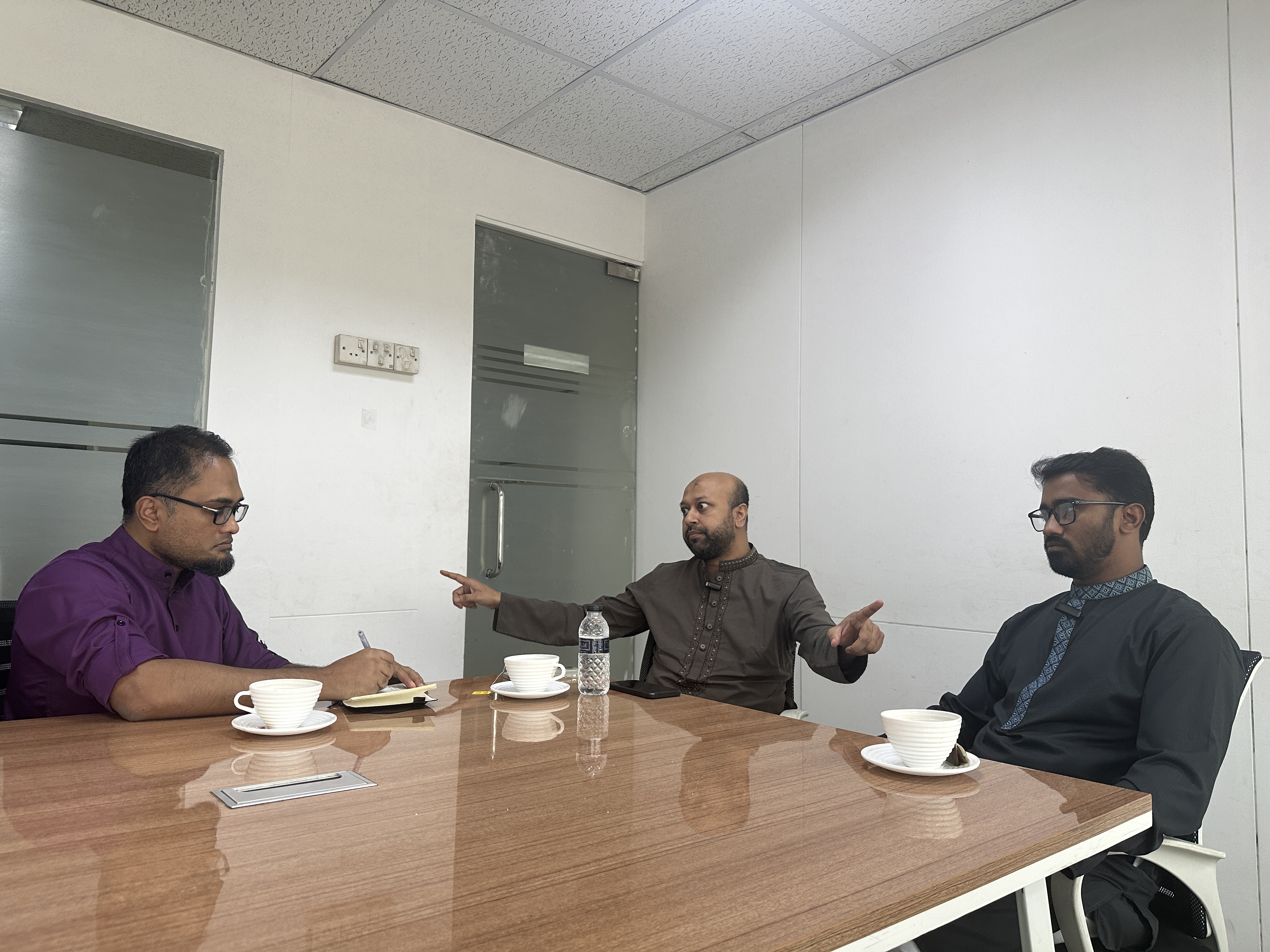
The story of a new Bangladesh is emerging among the youth, comprising 35 to 40 million voters who want to see a new political narrative. If the BNP or other parties can rehabilitate this new vision, the political landscape could change. However, if they fail to embody this new aspiration, they risk being outpaced by time.
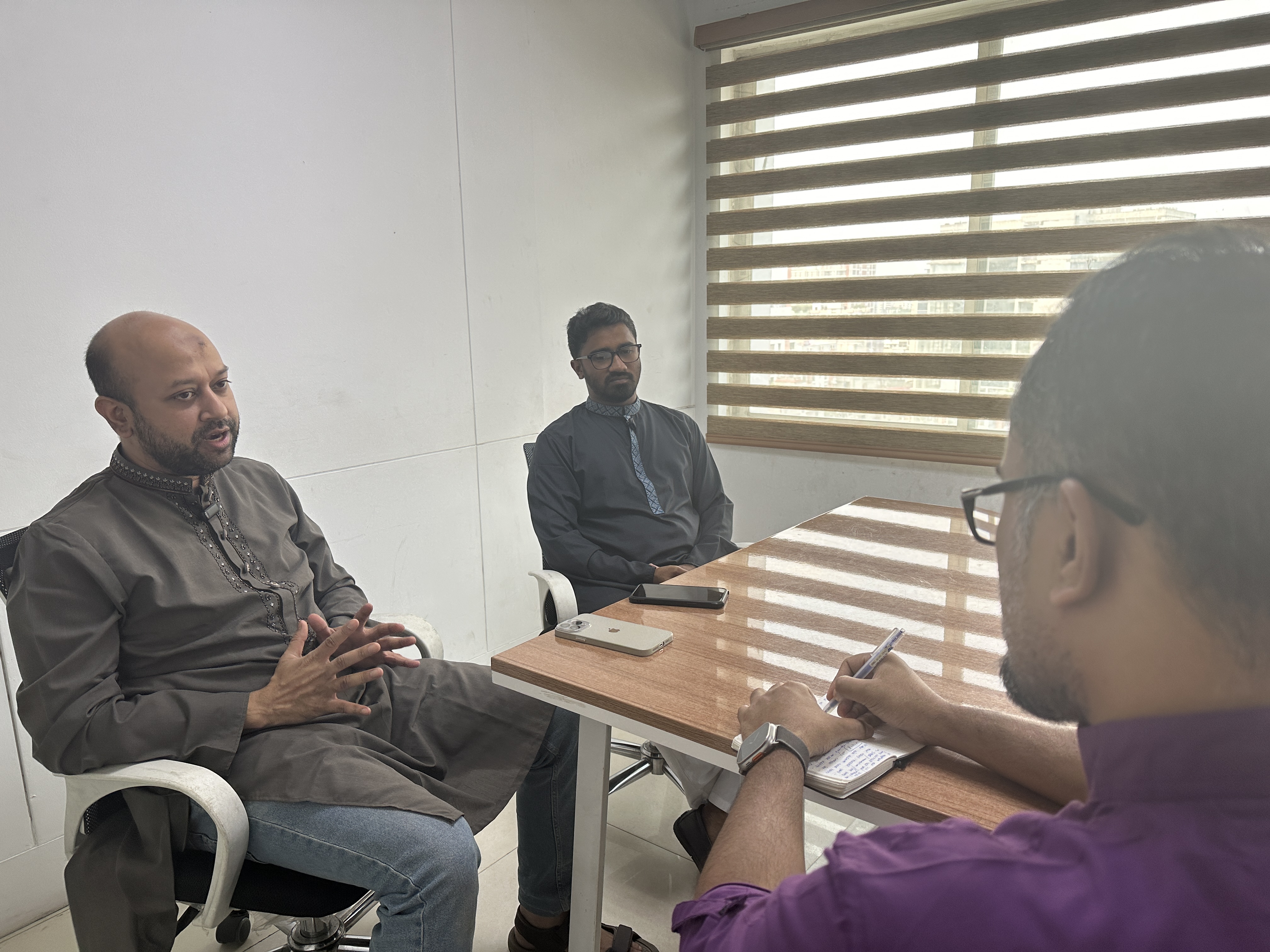
Historically, smaller political parties in Bangladesh have not succeeded. Figures like Dr. Kamal Hossain from the Gano Forum, who emerged from the Awami League, and B. Chowdhury from the BNP have also struggled to deliver change. Meanwhile, Islamist groups are attempting to unify and create a platform, although their effectiveness is still in question.
The aspirations of the youth for a new political party are evident, but we must ask whether they are truly in a position to deliver. We fully support their efforts. The key question remains: after any major revolution, can someone emerge as a national leader—like Erdoğan or Imran Khan—to unify these splintered aspirations into a coherent political movement? We believe there is potential for a new political landscape if these aspirations can be consolidated under strong leadership.
MRK: How can we expect the Awami League to participate in elections? Allowing them to do so would mean forgiving them for these crimes and politically rehabilitating them, which I cannot accept. This generation of politicians will not accept it either. Even if our senior leaders consider forgiving the Awami League and letting them participate in elections, we cannot condone that. Those of us actively involved in this movement will not accept it.
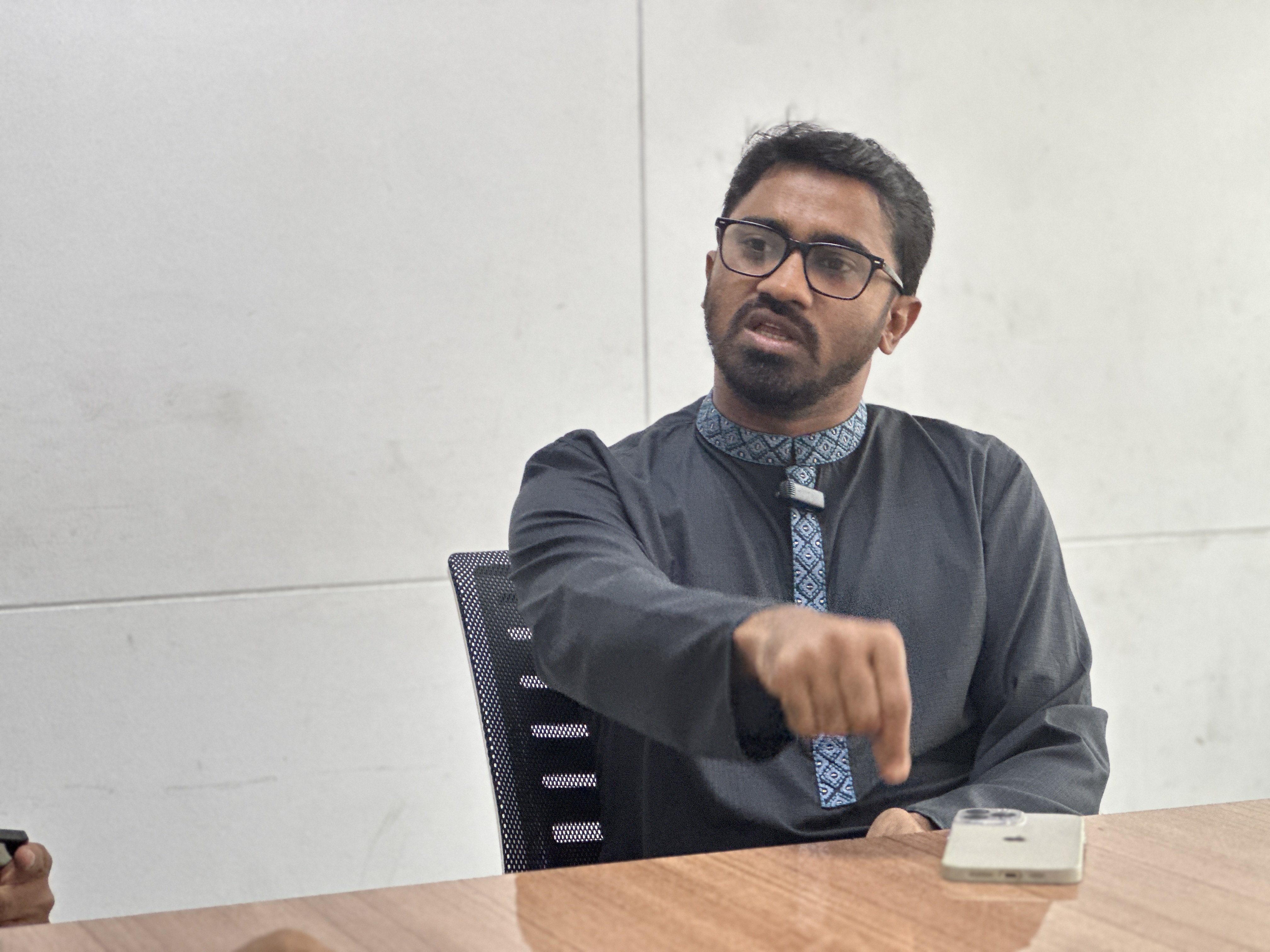
There is a strong desire among the people for a third political force, a new political power that began to emerge during this mass uprising. However, as time passes, this aspiration is diminishing. Why? Because the actions of the students have not been effectively communicated to the public.
In various recruitment cases, students have been involved in questionable activities, including swearing in vice-chancellors. Additionally, there are stories of individuals selling their jewelry to contribute to flood relief—my own earrings were given away because I had no money. These incidents have eroded public trust and confidence.
Nevertheless, the aspiration for a new political movement can still be revived. If students believe they can unite young groups from various places to realize this goal, that spirit can be reignited among them.
We, who have directly led this uprising, along with others like Fuad from the AB Party and Noor from the Gana Adhikar Parishad, and other young individuals across different parties, must unite. They could be artists, lawyers, and if they come together, a new force can emerge. If we, the youth, remain fragmented, it will not work.
FM: Sheikh Hasina is undeniably an important political figure in Bangladesh's history. The question of whether she is a deposed dictator raises the issue of her potential return to the country for trial. How do you perceive this idea? Would it be beneficial or detrimental? What would serve the country's best interests? First, is such a return even feasible? What are the implications, both positive and negative?
AF: There are already over two hundred cases filed against Sheikh Hasina in various criminal courts and special tribunals for war crimes and crimes against humanity, and I believe these should be investigated thoroughly. If sufficient evidence is found, prosecution should follow.
When the case goes to trial, Sheikh Hasina, as the defendant, must be allowed to present her defense. The court will invite her to provide evidence, and she may receive a warrant or a request to appear. If she fails to show up multiple times, it could lead to a conviction in her absence, which might then become final and subject to appeal.
Regarding sentencing, there will be questions about how her sentence will be enforced if she is convicted. The conversation would then turn to the state's approach to implementing the sentence from a criminal justice and administrative standpoint.
There are two potential paths. One option is a prisoner exchange agreement with India, assuming she is currently in Delhi, allowing the Bangladeshi government to request her return. The second option would be to issue an Interpol warrant if India claims not to have her in custody. Many countries, including India, are involved in this issue.
Efforts should continue to ensure her return for a fair trial, guaranteeing that justice is served properly. It's important to note that she is currently an accused individual, not a convicted criminal. Our opposition to her should not lead to oppression of anyone else. Justice must be pursued diligently, and the government needs to prioritize its responsibilities.
I won't hasten to write a letter requesting her return at this moment. Instead, my focus will be on managing the country’s economy, law enforcement issues, and political stability, which must take precedence.
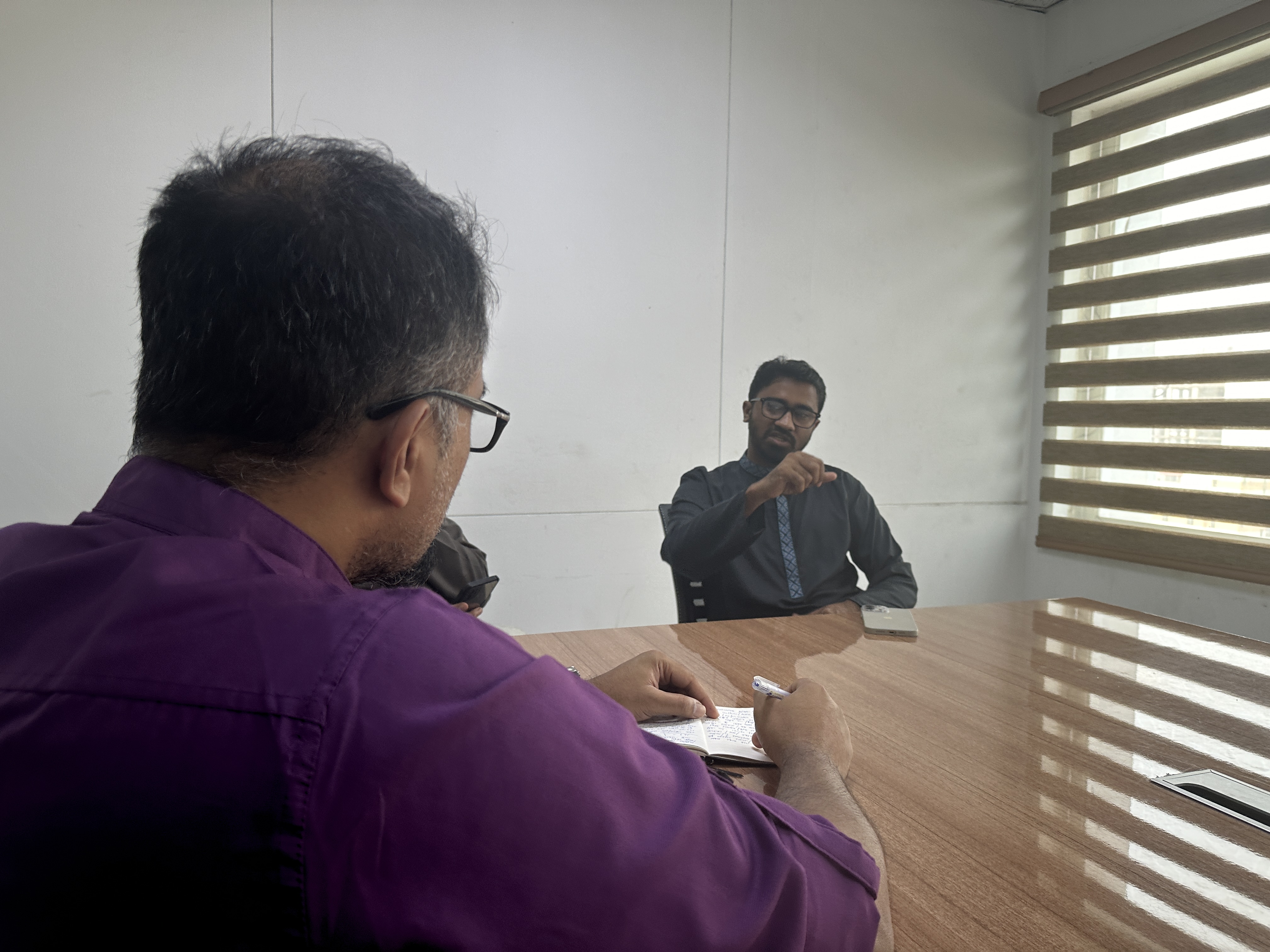
MRK: One of the main responsibilities of this government is to ensure justice for acts of genocide. To achieve this, Sheikh Hasina must be brought back to Bangladesh to stand trial. While I can't dictate how that should happen, as a politician, I urge the interim government or the next government to consistently work towards her return and hold her accountable in a trial.
FM: Thank you both.
—

